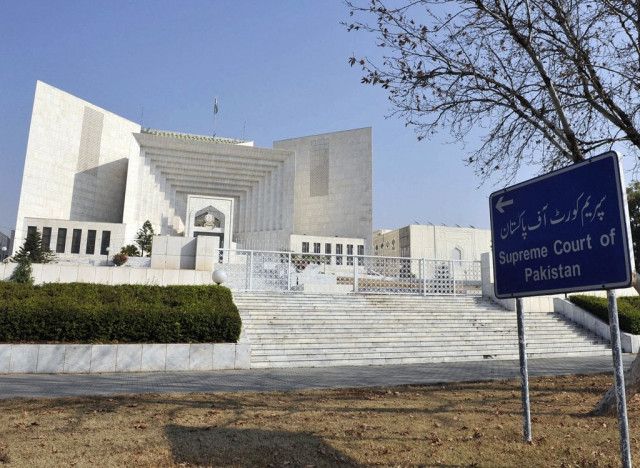Top court explains how to ensure fair criminal case trial
SC says right of fair trial is violated if accused is deprived of cross-examine a witness deposing against him

An AFP file image of the Supreme Court of Pakistan.
"The Constitution mandates a fair trial and due process. A person arrested for an offence (1) must be informed of the grounds of his arrest; (2) must be permitted to consult with and be defended by a lawyer; (3) must be provided with the information of the offence he is charged for; (4) must be provided with an opportunity to cross-examine witnesses who depose against him; (5) must be given an opportunity to explain the circumstances disclosed in evidence against him; and (6) must also be provided an opportunity to produce evidence in his defence,” said a four-page judgment authored by Justice Qazi Faez Isa in a case where the complainant had challenged the lower court order allowing the accused counsel to cross-examine him in a murder case.
“These are also necessary ingredients to ensure the fairness of a trial,” the order further stated.
The judgment noted criminal trial of an accused must “be conducted with utmost fairness".
The court also held that fundamental right of fair trial which the constitution guaranteed was violated if an accused was deprived of the opportunity to cross-examine a witness deposing against him.
The judgment said that the constitution prescribed important safeguards against depriving a person of his "life or liberty”and with regard to arrest and detention, which included “the right to consult and be defended by a legal practitioner of his choice”.
However, the apex court noted that the concept of joint cross-examination was one which was not recognised by the law.
"We may observe that courts and counsel should not resort to methodologies which are not sanctioned by the law as in doing so they may inadvertently create unnecessary complications. They must also realise that resort to novel concepts may undermine the
prosecution case and benefit the accused," said Justice Isa in his ruling which was endorsed by another member of bench Justice Sardar Tariq Masood.
The court also declared that in cases where there was more than one accused, the presiding officer while recording the cross-examination of a witness should mention the name of the accused and/or his lawyer who is cross-examining the witness.
Facts of case
The case pertains to Muhammad Waseem Raza who was murdered on March 22, 2018 at 5:15pm.
The crime was reported to the police the same day and first information report (FIR) No96 was registered at police station Ustarzai of district Kohat at 6.40 pm.
The crime was reported by deceased’s uncle, Muhammad Bashir, who is the petitioner herein.
Four persons were nominated in the FIR of whom two were identified as Rukhsar and Suhail.
The statement of the complainant was recorded in the court on April 20, 2019 and on the same date, his joint cross-examination was conducted by the counsel representing the accused Rukhsar and Suhail.
SC benches to start work from April 13
However, subsequently, Rukhsar, through his counsel, submitted an application under section 540 of the Code of Criminal Procedure, 1898 (“the Code”) stating that he had not been given an opportunity to cross-examine the petitioner-witness, therefore, an opportunity to do so be provided. This application was allowed by Kohat sessions judge.
The petitioner assailed the same by filing a criminal revision petition before the Peshawar High Court (PHC) wherein the PHC judge upheld the order and dismissed the revised plea.
The apex court in its order observed that Chapter X of the Qanun-e-Shahdat Order, 1984 sets out the methodology for the examination of the witness.
Examination of witness by the party calling him is the “examination-in-chief” which is followed by “cross-examination” by the defence and then such witness’ “re-examination” may take place.
Supreme Court approves interim bails
“The right to cross-examine is the right of “the adverse party” which right he/she may forego but one which he/she cannot be deprived of.”
The court noted that since accused Rukhsar was not granted an opportunity to cross-examine the petitioner who had deposed against him, he submitted an application under section 540 of the Code to summon the petitioner-witness and to permit him to cross-examine the petitioner-witness.
"The application allowed by the Additional Sessions Judge and his decision was upheld by the High Court. Rukhsar was deprived of a valuable right to cross-examine the petitioner-witness, therefore, allowing him to be summoned and cross-examined fully accorded with the law," the judgment said.



















COMMENTS
Comments are moderated and generally will be posted if they are on-topic and not abusive.
For more information, please see our Comments FAQ